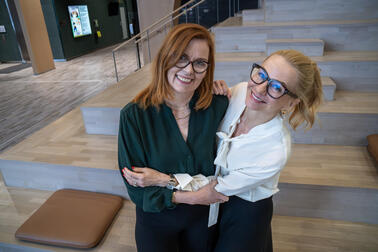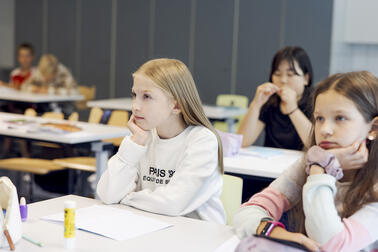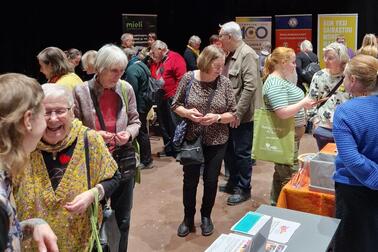
What everyday measures can general upper secondary school students take to improve their ability to cope?
“I often use my phone too much at night. I have now made conscious decisions on small things that affect sleep quality. I don’t use my phone at night, and I have made it a habit to go outside. All this improves my sleep,” says student Seela Merenluoma from Sibelius-lukio Upper Secondary School.
“I have incorporated calming moments in my daily life and drawn my thoughts on paper. I have noticed that I now sleep better, and it has impacted my wellbeing,” says Anniina Erkkilä from Helsinki Upper Secondary School of Natural Sciences.
Upper secondary school students have made changes in their daily lives based on study units focused on wellbeing. Merenluoma took a course on sleep and Erkkilä took a course on wellbeing.
Both courses were developed as part of the General Upper Secondary Education Quality and Accessibility Project (lukiokoulutuksen laatu- ja saavutettavuushanke) in City of Helsinki municipal general upper secondary schools. The project was funded by the Finnish National Agency for Education.

“As specialists in student welfare, we wanted to make the students think about what would best help them. We wanted to teach students to sleep better and make a positive change, instead of just giving students information on sleep. We wanted to incorporate the methods in the students’ daily lives,” says Psychologist Piia Penttilä from Sibelius-lukio Upper Secondary School.
Practical tips included a special moment for worries before going to bed and the ‘dream ogre,’ i.e. insomnia distanced in the form of a character: “Why is that thing back again?”.
Lively discussion on sleep with students
During the seven meetings of the sleep course in Sibelius-lukio Upper Secondary School, the topic was approached with different themes by using group discussions and sleep diaries.
“The discussions were enthusiastic and included interaction between students from different years in exceptional ways compared to daily life at the school. We gave each other advice and tips, and we also received them from the teachers. It was more than just sitting in a classroom and studying. My sleep quality hasn't improved yet, but since I have been working on myself this entire time, things have started to get better. Thinking back on the course, it really did benefit me a lot,” says Seela Merenluoma gratefully.
The sleep course at Sibelius-lukio Upper Secondary School will continue in the next school year, and based on feedback, the intention is to also discuss the content of dreams going forward.
“Word about the positive experiences gained in the course is getting around; many ask if there are places on the course. This is a good fit here at ‘Sibis’. Many music and dance enthusiasts go here, and some of them are nearly professionals at this stage. They have a lot on their plate, and they need to think of ways to relax, prioritise and take care of themselves. The theme of coping with constant expectations is also on people’s minds. “It is OK to rest sometimes,” says School Social Worker Sanni Sihvola from Sibelius-lukio Upper Secondary School. Physical activity specialist Jami Laaksonen also participated in providing the course.
Efficient way to share wellbeing tips
“On the course, student welfare staff are able to address twenty students at a time. The message reaches several students, and without booking any appointments. My colleagues host one or two meetings each but already feel empowered by the work. Our shared idea is that improving wellbeing is not about technique or knowledge, but achieving a deeper understanding, and first and foremost about the student learning to be in the present,” says Katja Hyry.
Based on the study unit, Hyry has compiled the ‘Hyvinvointikurssin ohjaajan opas’, a guidebook for wellbeing course instructors, with her colleagues. The guidebook was published in the Library of Open Educational Resources at the beginning of the year as part of the project.
Student Anniina Erkkilä says that she liked the course meetings and learned more about the connection between stress and temperament, time management and herself.
She also remembers the volunteer work that the students got to try during the course.
“It was something completely new to me and I found it very pleasant. In the future, I am going to volunteer again when the time is right,” Anniina Erkkilä says.
The General Upper Secondary Education Quality and Accessibility Project (Lukiokoulutuksen laatu- ja saavutettavuushanke, 4/2023–7/2025) supports the development of courses on wellbeing in general upper secondary education.
The quality of City of Helsinki municipal general upper secondary education is developed with support from the General Upper Secondary Education Quality and Accessibility Project funded by the Finnish National Agency for Education. The project is executed in cooperation with staff, students and guardians at City of Helsinki general upper secondary schools.
The project aims at improving the quality of education from three perspectives: quality management and knowledge management, pedagogical development and learning capacity, and wellbeing.


